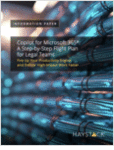Last week, in West Virginia v. EPA, 597 U.S. ____ (2022), the U.S. Supreme Court held that Section 111(d) of the Clean Air Act did not grant the Environmental Protection Agency (EPA) the ability to devise emissions caps based on the generation shifting approach the EPA took under the Obama administration’s Clean Power Plan. The Court’s opinion focused on the “major questions doctrine,” which under constitutional separation of powers mandates that an administrative agency have a “clear congressional authorization” behind administrative actions and rulemaking. The EPA claimed Section 111(d) of the Clean Air Act gave it the ability to develop the Clean Power Plan to shift the nation’s energy consumption from traditional energy sources (such as coal and natural gas) to renewables, with the goal to reduce coal power consumption by 11% by 2030 (from 38% in 2014 to 27%).
The Supreme Court stayed implementation in 2016. The Clean Power Plan was repealed in 2019 by the Trump administration, because the EPA said that it had exceeded its statutory authority in developing the Clean Power Plan, as Section 111(d) focused on individual facilities (e.g., a power station), not facilities at the grid level. The EPA decided that Congress did not intend in Section 111(d) to delegate authority to regulate the entire energy sector (i.e., there was no clear statement of legislative intent). A number of states and private parties challenged the repeal and proposed replacement framework, the Affordable Clean Energy Rule. The EPA decided after President Biden took office that it would renew its effort at rulemaking under the Clean Power Plan. Last week’s decision followed.
This content has been archived. It is available through our partners, LexisNexis® and Bloomberg Law.
To view this content, please continue to their sites.
Not a Lexis Subscriber?
Subscribe Now
Not a Bloomberg Law Subscriber?
Subscribe Now
LexisNexis® and Bloomberg Law are third party online distributors of the broad collection of current and archived versions of ALM's legal news publications. LexisNexis® and Bloomberg Law customers are able to access and use ALM's content, including content from the National Law Journal, The American Lawyer, Legaltech News, The New York Law Journal, and Corporate Counsel, as well as other sources of legal information.
For questions call 1-877-256-2472 or contact us at [email protected]


 Credit: Erickson/Adobe Stock
Credit: Erickson/Adobe Stock







